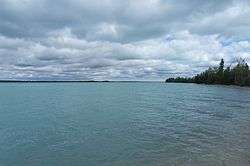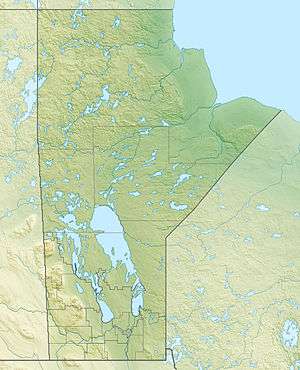Little Limestone Lake
Little Limestone Lake is a lake located in Little Limestone Lake Provincial Park in northern Manitoba, Canada, about 500 km (310 mi) north of Winnipeg, and 65 km (40 mi) north of the town of Grand Rapids, Manitoba. It is located in the 4,095-hectare (10,120-acre) Little Limestone Lake Park Reserve, an example of karst geology, in the Manitoba Lowlands. The eastern shore is within the traditional territory of the Mosakahiken Cree Nation.[1] Little Limestone Lake Park Reserve is an IUCN (World Conservation Union) protected area. It was designated mainly for conservation of a specific natural feature of outstanding or unique value.[2][1]
| Little Limestone Lake | |
|---|---|
 Little Limestone Lake | |
 Little Limestone Lake | |
| Location | Little Limestone Lake Provincial Park, Manitoba, Canada |
| Coordinates | 53°47′N 99°19′W |
| Type | lake |
The lake is considered to be the largest and most outstanding example of a marl lake in the world.[3][2] It is a turquoise body of water that changes colour as calcite in the water dissolves or precipitates depending on temperature. When the water is warm, calcite comes out of the solution and forms microscopic crystals, which give the water its milky white colour.[3] The source of the calcite is underground water, which flow into the lake in significant quantity.[1]
References
- Manitoba Government. "Little Limestone Lake Provincial Park" (PDF). gov.mb.ca. Archived from the original (PDF) on 2014-05-30. Retrieved 2014-05-30.
- "Little Limestone Lake: The world's largest and most outstanding marl lake regularly changes color". Atlas Obscura. Atlas Obscura. February 2017. Retrieved February 13, 2017.